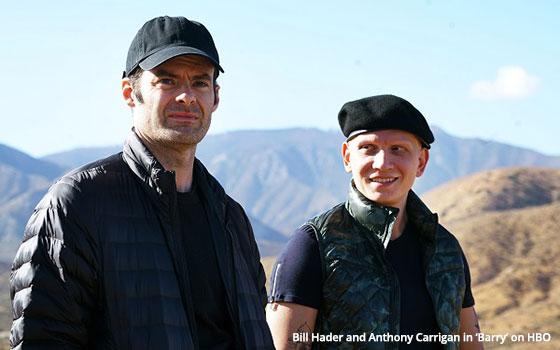
Bill Hader and Henry Winkler have received the lion’s share of attention for their performances in HBO’s “Barry.”
And there is nothing wrong with that. It is
Hader's show. He is a co-creator of the show (along with Alec Berg), and also a director, a writer and the show's star playing the role of the title character. Hader won a Best Actor in a Comedy Emmy
for the role last September.
And Winkler won his first-ever Emmy Award (for Best Supporting Actor in a Comedy) just last September as well for the first season of “Barry” at the
age of 72. Trivia buffs please note: Winkler was previously nominated for Best Actor in a Comedy Series for three consecutive years in the 1970s for playing Fonzie on “Happy Days,” but
never won. Not cool! Ayyy!
advertisement
advertisement
In “Barry,” Winkler has won acclaim for the role of Gene Cousineau, an aging actor who runs his own, and very self-styled acting school in Los Angeles.
As an actor, Winkler plays an actor perfectly. His performance is a gem.
His acting classes are a key element of the show, whose premise is: Emotionless hitman (the character of Barry played
by Hader) stumbles into acting classes and after exploring his own psyche in various acting-school exercises and assignments, he finds he does not enjoy killing people as much as he used to.
And this is where the character of NoHo Hank comes in. He is a man who you might describe as a New Age gangster -- ruthless one minute, and sharing and caring the next. He is a Chechen mob boss in
L.A. who repeatedly crosses paths with Barry, sometimes in friendship and sometimes as Barry's sworn enemy.
The second season of “Barry” started two Sundays ago (Episode Three, of
eight, premieres this Sunday night on HBO). In the season premiere on March 31, Chechen Hank (played by Anthony Carrigan) played a big scene to perfection and stole the show.
The scene had
Hank narrating a letter he was writing home to his family in Chechnya (actually, it was probably an email). In the letter, Hank reported how well things were going for the family’s crime
interests in California. He also made sure to mention how much he is enjoying working with a once-rival mob faction, an organization of Bolivians.
“The L.A. operation is going super
great!” he reports. The Bolivians, he insists, “are wonderful dudes!” In particular, Hank seems to have come under the spell of the Bolivian faction’s charismatic leader, who
Hank evidently idolizes.
The scene was hilarious. It was one of the best-written bits of comedy in any TV comedy series seen in quite some time.
It actually was funny. And while this
should be a self-evident goal in any scripted half-hour that leans more comedic than dramatic, the TV Blog has been reporting for a year or two (or more) on a new wave of comedies that contain
virtually no activity that anyone in his or her right mind would characterize as comedy.
HBO is as modern a creator of subscription-based video content as any other content company out there.
And thank heaven, HBO largely eschews this non-comedic trend as exemplified by such recent non-comedies (should we call them “non-coms”?) as “Baskets,” “Better
Things” and “Atlanta,” all of which happen to be on FX.
“Barry” is every bit as offbeat as these other comedies try to be. And yet, it still manages to be funny,
even though it does contain a considerable amount of violence -- for a TV comedy. Oh, well, what did you expect? The title character of this comedy is an assassin. In this comedy, even the violence
makes sense.